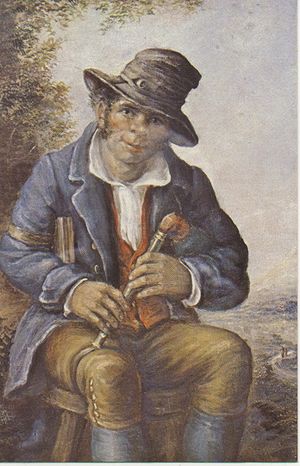John Peter Pruden facts for kids
Quick facts for kids
John Peter Pruden
|
|
|---|---|
 |
|
| Born | 31 May 1778 |
| Died | 28 May 1868 (aged 89) Winnipeg, Manitoba, Canada
|
| Nationality | English |
| Occupation | Hudson's Bay Co. fur-trader; Councillor of Assiniboia |
| Spouse(s) | 1. Patasegawisk, a.k.a. "Nancy" 2. Ann Armstrong |
| Children | Elizabeth, William, Charlotte, Peter, Maria, Cornelious, Arthur, James, John Peter, and Caroline |
| Parent(s) | Peter Pruden and Margaret Smith Fraser |
John Peter Pruden (born 1778, died 1868) was an important early pioneer in western Canada. This area was once known as Rupert's Land. He worked for the Hudson's Bay Company (HBC) for many years as a fur trader. During his time, he met and traded often with First Nations groups. These included the Cree and Blackfoot people. Pruden was known for speaking the Cree language very well.
Contents
John Peter Pruden's Early Life
John Peter Pruden was born in Edmonton, Middlesex, England. He was christened on May 31, 1778. It is not fully known how he joined the Hudson’s Bay Company (HBC) in 1791. He was only 13 years old at the time. It seems his local church helped pay for his apprenticeship with the HBC. This was unusual for new employees.
Pruden's parents, Peter and Margaret, both passed away when he was young. This suggests he might have been an orphan when he started working for the Company.
Working for the Hudson's Bay Company
Starting as an Apprentice
Pruden began his work with the HBC in September 1791. He arrived at York Factory by ship as a 13-year-old apprentice. He spent four years learning the fur trade at York Factory.
Four years later, Pruden helped escort James Curtis Bird to Carlton House. This post was in the Saskatchewan District. Pruden and Bird worked under a leader named William Tomison. In May 1796, Pruden moved to a post called Fort Edmonton or Edmonton House. This location is near what is now Fort Saskatchewan, Alberta.
Moving to New Posts
In 1798, Pruden became a "writer" at Fort Edmonton. This job involved keeping records and accounts. He moved to Buckingham House in 1799. The next year, he returned to Edmonton House.
When he got back, his friend Bird was in charge of the post. Bird sent Pruden to build a new fur-trading post. This new fort was located between Edmonton House and Rocky Mountain House. This new fort was built on the site of present-day Edmonton. Edmonton is now the capital city of Alberta, Canada.
Naming the City of Edmonton
John Peter Pruden was the one who suggested the name "Edmonton" for the new fort. He chose this name because it was his own hometown in England. It was also the home of Sir James Winter Lake, who was a deputy governor of the HBC.
Becoming a Chief Factor
By 1832, John Peter Pruden had worked for the HBC for 41 years. He was promoted to "Chief Factor." A Chief Factor was like a manager or boss of a fur-trading district. At that time, no other Chief Factor had worked for the company longer than him.
Life After Fur Trading
Retirement and Public Service
One year after becoming Chief Factor, Pruden retired from the HBC. He was 59 years old. He moved to the Red River Colony. This area is now Winnipeg, Manitoba, Canada.
In 1839, he was appointed to the Council of Assiniboia. This was a local government group. In 1844, he joined the Board of Public Works. This was an important committee of the Council. He also served as part of the local court.
In 1851, Eden Colvile, a leader of Rupert's Land, offered Pruden a job as a magistrate. However, Pruden was 73 years old. He turned down the offer, saying he was too old and unwell. Even so, Pruden lived for more than ten more years in retirement at Red River.
Later Years and Family
John Peter Pruden passed away at Red River on May 28, 1868. He was almost 90 years old. He was buried at St. John's Cathedral Churchyard in the Red River Colony.
Pruden lived a long and full life. He left behind a large family, including many children, grandchildren, and great-grandchildren. Many of his Métis (or mixed-blood) descendants married into other important Métis families. Pruden also helped his half-nephew, John Edward Harriott, start a career in the fur trade with the Hudson's Bay Company.
Pruden had a "country" wife named Patasegawisk, also known as "Nancy Pruden." She was with him for almost 30 years and they had many children together. She passed away in August 1838. His second wife was Ann Armstrong, a British schoolteacher. They married at Red River in December 1839. Ann was 49 years old, and they did not have children together. Ann returned to England in 1869 and died there in 1887.
See also
 | Valerie Thomas |
 | Frederick McKinley Jones |
 | George Edward Alcorn Jr. |
 | Thomas Mensah |

